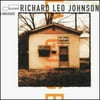Detailed product description
.com Arkansas native Richard Leo Johnson has drawn comparisons with the late Michael Hedges and John McLaughlin, but the essence of Johnson's far-reaching guitar sound is grounded in mountain bluegrass and folk music, as well as jazz and left-of-center classical, with a nagging nod to New Age. Johnson's second Blue Note offering finds the 12-string virtuoso in a collaboration, of sorts--he cut the initial tracks solo, then sent tapes to various musicians, including Oregon's Paul McCandless, drummer Matt Wilson, and the ex-Allman Brothers guitarist, Warren Haynes. The musicians returned their taped contributions, and the assembled sounds create a band, again, of sorts. There is an occasional sense of clutter, amplified by Johnson's spectacular technique, a blitzkrieg of bluegrass string hammers, soaring, bell-like harmonics, funky chordal slides, pretty fingerpicking, and scalding, fret-devouring melodic runs. The opening "Hip Hop Zep" is a blast of everything that makes Johnson so unique, from riveting full-guitar body slaps to lush picking. "Event Horizon" recalls Pat Metheny's high-plains soaring (with lots of surreal hammering effects), while "New West Helena Blues" is a dead ringer for a supercharged Leo Kottke. Two of the best tracks, "Sketches of Miles" and "Freestone Peach," are with Warren Haynes. Unlike the New Agey tracks with Paul McCandless, Haynes's authentic blues slides and ringing sustained single notes make Johnson sound more grounded and give his songs greater substance. But with humorous jigs ("Chuck Soup"), Indian-tinged standards ("Cheek to Cheek"), and father-daughter duets ("Daddydaughterduo"), Johnson is obviously not at a loss for material. Language is a full-course meal. --Ken Micallef Review Guitarist Richard Leo Johnson once proclaimed, "A guitar is something to be screwed with." The Arkansas native's 1998 debut, the solo-guitar Fingertip Ship, upheld that ethos perfectly, capturing this homegrown talent - no lessons, no nuthin' - as he coaxed pristine textures from his 12-string with an assortment of oddball tunings and a truly formidable technique.Language further cements his role as the current voice on 12-string guitar, continuing a lineage that includes Ralph Towner and Leo Kottke. Comparisons to those past masters are warranted - especially considering the appearance here of Oregon vets Paul McCandless and Glen Moore. While songs like "Sweet Jane Thyme," which feature McCandless's all-too-recognizable oboe, hew precariously close to Towner territory, Johnson's singular voice - the combination of fervent string hammer-ons, open-string harmonics, and arpeggiated, cascading chords - rescues these songs from imitating Oregon completely. But indeed, Language flows with a similarly searching spirit, while incorporating dynamic shifts that recall Pat Metheny's As Falls Wichita album. Even John McLaughlin and Shakti are evoked in Johnson's welcome tendency to capture sub-Asian grooves with his rhythmic sensibility.If pairing R.L.J.'s occasionally overt melodicism and open chords in tandem with percussionist Cyro Baptista - who provides some New Agey wind chimes and neo-tropical effects - yields something akin to smooth, the guitarist opens creative floodgates with introspective solo guitarfests ("West Helena Blues") that capture the probing spirit of his debut. Ultimately, it's Johnson's unique, orchestral approach to guitar that make him and his music special.--- Mike Bieber, JAZZIZ Magazine Copyright �� 2000, Milor Entertainment, Inc. -- From Jazziz
